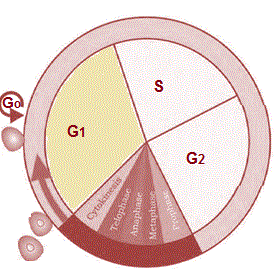The Cell cycle
Cell division is a very important process in all living organisms. During the division of a cell, DNA replication and cell growth also take place. All these processes (cell division, DNA replication and cell growth) have to take place in a coordinated way to ensure correct division and formation of progeny cells containing intact genomes.
The sequence of events by which a cell duplicates its genome, synthesises the other constituents of the cell and eventually divides into two daughter cells is termed cell cycle.
Although cell growth (in terms of cytoplasmic increase) is a continuous process, DNA synthesis occurs only during one specific stage in the cell cycle.
The replicated chromosomes (DNA) are then distributed to daughter nuclei by a complex series of events during cell division. These events are themselves under genetic control.
Stages of the cell cycle
In eukaryotes, the cell cycle consists of four discrete phases: G1, S, G2, and M.
The S or synthesis phase is when DNA replication occurs
The M or mitosis phase is when the cell actually divides.
The two phases (G1 and G2) are so-called gap phases (less dramatic but equally important).

